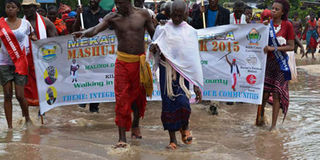Marginalised communities reap big from State jobs

Mijikenda community celebrates the annual "Mekatilili Mashujaa Peace walk" on August 3, 2015 in Kilifi Town. Many Mijikendas have benefited from State appointments. PHOTO | WACHIRA MWANGI | NATION MEDIA GROUP
What you need to know:
- PSC said it is making the right step towards bridging the gap between the marginalised communities and the dominant ones.
The Mijikenda, Maasai, Borana and the Shirazi are some of the top minority and marginalised communities that benefited from jobs in the Public Service Commission (PSC).
A report tabled by the commission before the National Assembly Public Accounts Committee (PAC) indicates that in the period of 2014-2017, a total of 577 Mijikenda were recruited in public service, Maasai 548 and Borana had 285 while the Shirazi had 252 officers.
Under the period under review, Turkana had 231 officers recruited in the public service, Samburu 175, Teso 130, Kuria 112 and Pokomo 105.
Communities that had the least number recruited during the period include the Leysan with only one person, same to Walwana, Boni Sanye has seven, Sakuye eight and the Njemps had eight people.
GENDER
Although the numbers are still minimal compared to the representatives of other communities in the public service, PSC said it is making the right step towards bridging the gap between the marginalised communities and the dominant ones.
During the period under review, the commission pointed out that it has appointed 11,615 persons to various positions in the public service.
Out of these, 1,774 were new entrants and 9,841 were promotional appointments.
Among those appointed, 6,891(59.34 per cent) were male while 4,724 (40.66 per cent) were female.
INTERVIEWS
The commission noted that during the 2014/15 and 2015/16 financial years, the recruitment of new entrants into the public service was affected by transition to devolved units and the Capacity Assessment and Rationalisation Programme, which was aimed at redistribution of staff between the two levels of governments.
In a bid to reach out to more people during recruitment, the commission said they introduced teleconferencing to conduct interviews for candidates who cannot physically present themselves for interviews.
“The commission has entrenched inclusivity of minority and marginalised ethnic groups in the distribution of employment opportunities in the public service by adopting affirmative action policy to ensure they are represented in the public service,” part of the report reads.




